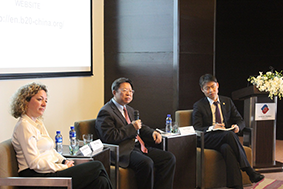Business priorities of the G20 as China assumes presidency for the first time

Chamber Vice President Sara Marchetta with B20 Sherpa Yu Ping and Sun Xiao, Policy Director and Liaison Officer, B20 Infrastructure Task Force
During an exclusive event on 3rd March, Mr Yu Ping, Sherpa of the B20 China, met with European Chamber members to explain the underlying themes for this year’s B20 and outline its overall aims.
Formed in 1999, the Group of Twenty (G20) is an international forum made up of 20 of the world’s major economies, including the EU and China. Members of the G20 account for 90 per cent of the world’s GDP and two thirds of the global population. Its main purpose is to govern economic activity and coordinate economic policy at a global level.
In response to the global economic crisis, the G20 Summit was established in 2008, with 10 subsequent meetings having taken place since. For each summit, the host country assumes the presidency and looks to spearhead efforts to tackle global challenges. China will be president for the first time in 2016, having taken over the presidency from Turkey at the end of 2015, with the summit taking place in Hangzhou from 4th to 5th September. The theme for this year is based around the idea of creating a world economy that is innovative, invigorated, interconnected and inclusive – the ‘4i’s’.
An integral part of the G20 Summit is the Business 20 (B20), a forum that feeds practical ideas and recommendations—in the form of structured reports—from the international business community into the main summit, to contribute towards G20 policy making. The B20 China will follow the same 4i’s theme as the G20 Summit, with discussions focussed around how to contribute to international efforts to increase global productivity, invigorate world markets, tap unutilised potential and remove barriers to economic growth.
Within the context of the 4i’s, the B20 China has identified four clusters of challenges: 1) growth has been identified as a top priority, so efforts will be made to develop a new plan that can deal with short- and mid-term demands and provide long-term solutions; 2) reform of international financial architecture, international taxation, green finance, energy exploration and innovation; 3) multinational and global trade, growth, the global value chain and global investment policies; and 4) the 2030 agenda for sustainable development.
The B20 China is presided over by Chairman Mr Jiang Zengwei, who is also Chairman of the China Council for the Promotion of International Trade (CCPIT). Mr Yu Ping, B20 Sherpa and former Vice Chairman of the CCPIT, heads the International Cooperation Committee which has two tracks: functional groups that organise meetings and provide logistics support; and taskforces, which provide the content and formulate recommendations.
The taskforces carry out the core function of the B20 through closed door meetings, teleconferences, joint meetings, special sessions at events, and seminars, to develop their respective papers. These papers form the basis of the B20 policy recommendation paper, which is then submitted to the G20. The taskforces and their respective priorities for B20 China are as follows:
| Trade and Investment | |
| Chair: Frank Ning, Chairman, Sinochem | |
| Priorities |
|
| Infrastructure | |
| Chair: Ren Hongbin, Chairman, Sinomach | |
| Priorities |
|
| Financing Growth | |
| Chair: Miao Jianmin, President, Chinalife | |
| Priorities |
|
| SME Development | |
| Chair: Jack Ma, Chairman, Alibaba | |
| Priorities |
|
| Employment | |
| Chair: Robin Li, Chairman and CEO, Baidu | |
| Priorities |
|
Each chair of these taskforces is supported by multiple co-chairs from Chinese and international companies such as China Merchants Group, Lenovo, Rio Tinto, Sinopec, Standard Chartered and Accenture.
Prior to the kick-off meeting on 26th January, chairs and co-chairs of each taskforce had worked together, along with executives and administrative officials from the G20, to identify their target areas for the year. These targets were then used to produce a draft paper for which comments were solicited from members, before the priorities were ordered. In total, each paper will eventually contain five to seven recommendations. In April and June, taskforce meetings will take place in Washington DC and Paris respectively, where the G20 International Cooperation Committee will review the papers in the context of the four issue clusters, and summarise each paper. The papers will then be utilised in relevant ministerial and working group meetings.


Recent Comments